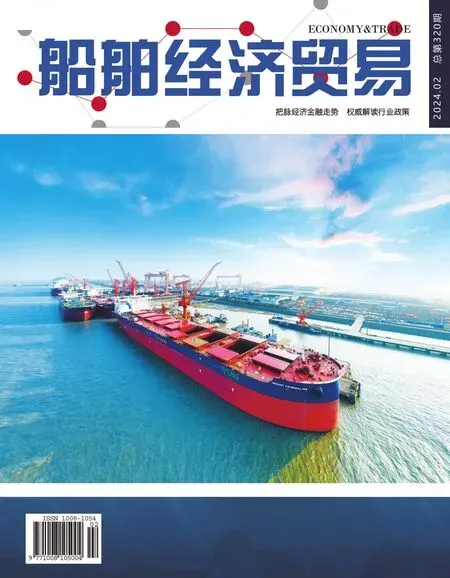CSNAME Project Chief Designer Calls on Taking over New Track of Ship Green Development
Guo Jiatai
"The energy transformation aimed at decarbonizing shipping is imperative, but it faces huge challenges." Hao Jinfeng, chief designer of the Project Department of the Chinese Society of Naval Architects and Marine Engineers (CSNAME), said in an exclusive interview that facing the energy transformation, China's shipbuilding industry should have a rational understanding of the green energy transformation, improve the construction and marine equipment supply capacity of green ships, enhance the core competitiveness, and seize the new track of green development.
Hao Jinfeng said: "We should be soberly aware that petrochemical fuels will remain dominant in the shipping industry for a long time to come." On the one hand, more than 90% of the current shipping fuel use is oil, bioenergy, hydrogen and hydrogen-based fuel account for less than 1%, oil is still the main fuel of the shipping industry,especially the ocean shipping. On the other hand, DNV predicts that shipping energy consumption only accounts for about 3% of global energy use. In other words, green fuel supply growth is lower than the demand growth in the shipping industry, which will compete with other industries for zero-carbon /carbon-neutral fuels. Hao said whether the shipping industry can get enough green fuel is a key issue.
In addition, estimates show that after comprehensive consideration of construction cost, fuel cost and operating cost, the carbon reduction cost of green fuel is reduced by about 28% or even higher than that of petrochemical fuel (based on the newly revised greenhouse gas emission reduction strategy and carbon tax forecast); the carbon reduction cost of energy saving technologies such as pneumatic cylinder and gas layer drag reduction is reduced by about 20%compared with these technologies. Hao pointed out that although the carbon reduction cost of ships using green fuel or energy-saving technology is lower for the fleet after they are put into operation, the cost of green fuel ships themselves and installing energysaving equipment is still high. Based on these realities, Hao suggested that China's shipbuilding industry should continue technological innovation in energy-saving technologies such as carbon capture technology and energy efficiency improvement, reduce equipment costs, and help improve the green and low-carbon level in the whole life cycle of ships.
Build green supply chain, strengthen marine equipment supply capacity.
According to the data, more than 50% of new ship orders adopted nonpetroleum fuel in 2023, compared with only about 30% in 2022. Moreover,7,500 ships will be subject to methanol,ammonia or other clean energy modifications in the next 10 years. In response, Hao said the market demand for marine equipment, such as storage systems and refueling systems, and carbon capture storage equipment is huge. Methanol, for example, in terms of supply unit marine equipment, by the first half of 2023, only Alfa Laval,CSSC 711 Institute and a few other companies have real ship performance,but in H2 2023 to the beginning of this year, orders increased sharply, CSSC 725 Institute’s Qingdao Shuangrui Marine Environment Engineering won dozens of sets of equipment orders.Hao Jinfeng noted that at present,the green marine equipment field is diversified, there are a number of well-known marine equipment enterprises at home and abroad,foreign countries have not formed an absolute technology monopoly, the localities have obvious advantages in some technical fields. She suggested that domestic marine equipment enterprises must seize this opportunity, establish their own technology system, master core technologies, and seize decisive opportunities in this track.

